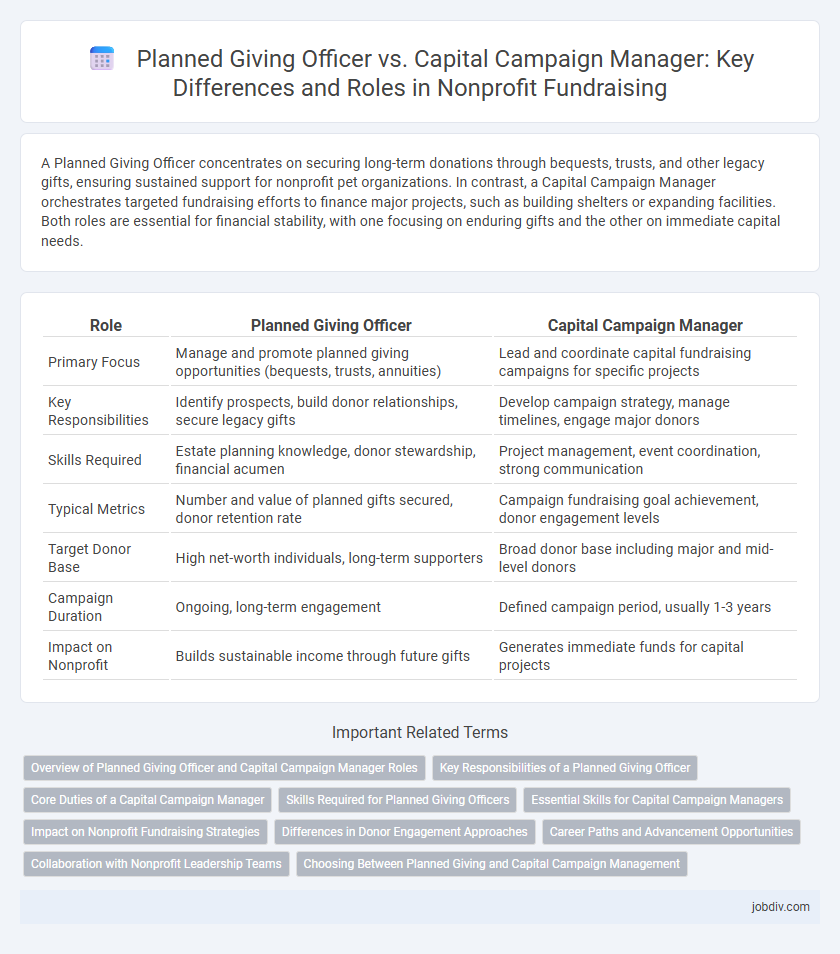A Planned Giving Officer concentrates on securing long-term donations through bequests, trusts, and other legacy gifts, ensuring sustained support for nonprofit pet organizations. In contrast, a Capital Campaign Manager orchestrates targeted fundraising efforts to finance major projects, such as building shelters or expanding facilities. Both roles are essential for financial stability, with one focusing on enduring gifts and the other on immediate capital needs.
Table of Comparison
| Role | Planned Giving Officer | Capital Campaign Manager |
|---|---|---|
| Primary Focus | Manage and promote planned giving opportunities (bequests, trusts, annuities) | Lead and coordinate capital fundraising campaigns for specific projects |
| Key Responsibilities | Identify prospects, build donor relationships, secure legacy gifts | Develop campaign strategy, manage timelines, engage major donors |
| Skills Required | Estate planning knowledge, donor stewardship, financial acumen | Project management, event coordination, strong communication |
| Typical Metrics | Number and value of planned gifts secured, donor retention rate | Campaign fundraising goal achievement, donor engagement levels |
| Target Donor Base | High net-worth individuals, long-term supporters | Broad donor base including major and mid-level donors |
| Campaign Duration | Ongoing, long-term engagement | Defined campaign period, usually 1-3 years |
| Impact on Nonprofit | Builds sustainable income through future gifts | Generates immediate funds for capital projects |
Overview of Planned Giving Officer and Capital Campaign Manager Roles
A Planned Giving Officer specializes in securing long-term philanthropic commitments through bequests, trusts, and other estate gifts, ensuring sustained financial support for the nonprofit. In contrast, a Capital Campaign Manager leads targeted fundraising initiatives to raise specific sums for major projects such as building expansions or endowments, coordinating donor relations, and campaign logistics. Both roles are critical for nonprofit sustainability, with Planned Giving Officers focused on legacy gifts and Capital Campaign Managers driving immediate, project-based funding.
Key Responsibilities of a Planned Giving Officer
A Planned Giving Officer spearheads the development and management of long-term gift strategies, including bequests, charitable trusts, and life-income gifts, to secure sustainable funding for nonprofit organizations. They build personalized relationships with donors, provide expert guidance on tax benefits and legacy planning, and collaborate with legal and financial advisors to ensure compliance and maximize impact. This role demands strong communication skills, deep knowledge of estate planning, and the ability to cultivate lasting donor partnerships that align with the nonprofit's mission.
Core Duties of a Capital Campaign Manager
A Capital Campaign Manager oversees large-scale fundraising initiatives by developing strategic plans, coordinating fundraising events, and managing donor relationships to secure substantial contributions for specific projects or capital improvements. This role involves setting campaign goals, monitoring progress, and collaborating with board members and stakeholders to ensure successful campaign execution. Their core duties emphasize resource mobilization, campaign promotion, and financial tracking to achieve targeted funding objectives.
Skills Required for Planned Giving Officers
Planned Giving Officers require strong expertise in financial planning, tax law, and donor relations to structure charitable contributions effectively. Proficiency in communication and relationship-building skills facilitates long-term donor engagement and the creation of personalized giving strategies. Knowledge of estate planning, trust administration, and complex gift vehicles like charitable remainder trusts distinguishes their skill set from Capital Campaign Managers.
Essential Skills for Capital Campaign Managers
Capital Campaign Managers excel in project management, donor relations, and strategic planning, ensuring multi-million dollar fundraising goals are met on schedule. Their proficiency in data analysis and volunteer coordination drives targeted outreach and maximizes donor engagement throughout the campaign lifecycle. Expertise in budget management and communication skills enables effective collaboration with stakeholders and successful promotion of the nonprofit's capital initiatives.
Impact on Nonprofit Fundraising Strategies
Planned Giving Officers cultivate long-term donor relationships through legacy gifts, significantly enhancing sustainable revenue streams and financial stability for nonprofits. Capital Campaign Managers drive large-scale fundraising initiatives targeting specific capital projects, generating substantial short-term funding boosts and heightened donor engagement. Both roles complement each other by balancing immediate capital needs with enduring endowment growth, optimizing overall fundraising strategies.
Differences in Donor Engagement Approaches
Planned Giving Officers cultivate long-term donor relationships by focusing on legacy gifts such as bequests, trusts, and endowments, ensuring sustainable contributions through personalized estate planning conversations. Capital Campaign Managers engage donors intensively over a defined period, driving major, time-sensitive fundraising goals through targeted outreach and compelling capital project narratives. While Planned Giving Officers prioritize strategic, patient donor cultivation aligned with future financial sustainability, Capital Campaign Managers emphasize high-impact, immediate donor mobilization to meet urgent organizational capital needs.
Career Paths and Advancement Opportunities
Planned Giving Officers specialize in legacy and endowment fundraising, developing long-term donor relationships to secure future gifts through wills and trusts, which often leads to senior roles in major gift or development leadership. Capital Campaign Managers drive large-scale fundraising projects focused on specific goals, gaining experience in project management and donor acquisition that can advance to executive director or chief development officer positions. Both paths offer distinct skills in fundraising strategy and donor engagement, with Planned Giving emphasizing long-term financial sustainability and Capital Campaigns focusing on targeted capital goals, influencing career trajectory and advancement opportunities within nonprofit development.
Collaboration with Nonprofit Leadership Teams
Planned Giving Officers collaborate closely with nonprofit leadership teams to develop tailored strategies for long-term donor engagement and legacy gift cultivation, ensuring sustainable revenue streams. Capital Campaign Managers work alongside executive directors and board members to coordinate large-scale fundraising initiatives, aligning campaign goals with organizational priorities for maximum impact. Both roles require seamless communication and strategic planning to drive mission-focused fundraising success within nonprofit organizations.
Choosing Between Planned Giving and Capital Campaign Management
Choosing between a Planned Giving Officer and a Capital Campaign Manager depends on the nonprofit's fundraising strategy and long-term financial goals. A Planned Giving Officer specializes in securing deferred donations through wills, trusts, and bequests, enhancing sustained revenue streams. Meanwhile, a Capital Campaign Manager directs large-scale fundraising initiatives aimed at immediate project financing or infrastructure development, driving short-term capital influx.
Planned Giving Officer vs Capital Campaign Manager Infographic

 jobdiv.com
jobdiv.com